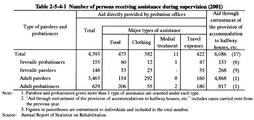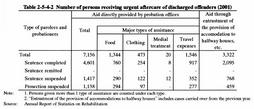| Previous Next Index Image Index Year Selection | |
|
|
1 Assistance during supervision, urgent aftercare of discharged offenders When the rehabilitation of probationers and parolees could be hindered by illness, injury, lack of a proper abode or occupation or other reasons, probation officers and volunteer probation officers give advice and guidance so that probationers and parolees are able to receive the necessary support from public welfare facilities. If such support cannot be obtained immediately or the support provided by such facilities is deemed to be inadequate, probation offices provide specific support. This is referred to as assistance during supervision.
Assistance during supervision includes (1) aid directly provided by probation offices, such as providing food and clothing, medical treatment travel expenses to the place of next abode and (2) aid through entrustment of the provision of accommodation to halfway houses and individuals. Table 2-5-4-1 shows the number of parolees and probationers who received assistance in 2001. The "Law for the Partial Amendment of the Law for Offenders Rehabilitation Services, etc." mentioned above also made partial amendment to the Offenders Rehabilitation Law, which provided for urgent aftercare of discharged offenders, so as to also provide urgent aftercare to offenders who are sentenced to fines and who are released or provisionally released from workhouses as well as juveniles who are discharged from juvenile training schools or whose provisional discharge period has terminated. Urgent Aftercare of Discharged Offenders is measures taken for inmates released on completion of their sentences, offenders given suspended sentence and suspects granted suspension of prosecution as well as those new targets mentioned above, who have been freed from physical constraint under the criminal procedures or protective measures, if (1) they are unable to receive support from their relatives or people who have relationships with them or aid from public welfare facilities and other institutions, or (2) it seems impossible for them to rehabilitate themselves only with such support or aid. This urgent aftercare of discharged offenders is provided, upon the application from the person in question, directly by directors of probation offices or through entrustment to halfway houses, for a period not exceeding 6 months from the date of discharge from the physical constraint. The contents of the aftercare are the same as those of assistance during supervision. This measure shall be further taken only where it is deemed to be particularly necessary for the rehabilitation of the offender and only for a period not exceeding 6 months. Table 2-5-4-2 shows the number of persons who received urgent aftercare in 2001. Table 2-5-4-1 Number of persons receiving assistance during supervision (2001) Table 2-5-4-2 Number of persons receiving urgent aftercare of discharged offenders (2001) |

